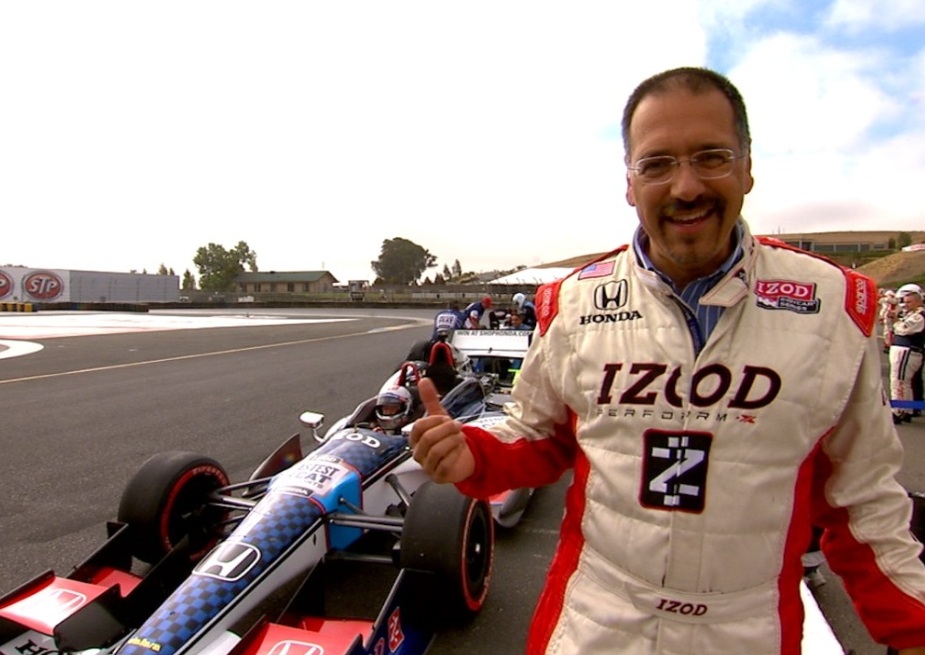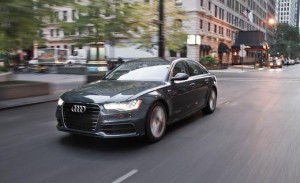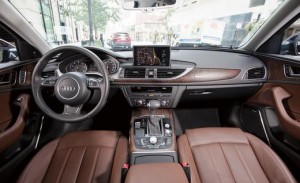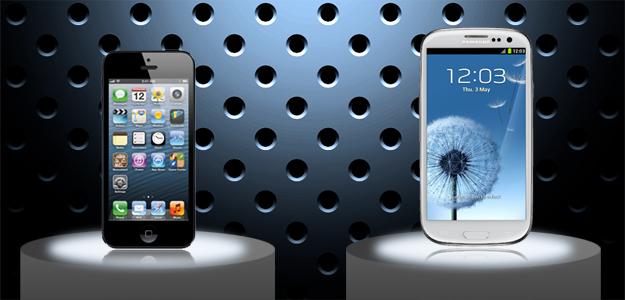Before you purchase your next vehicle it may be wise to take Brian Cooley’s advice before making your final decision. As the editor-at-large for CNET.com, a leader in its category of tech news and reviews, Cooley provides straightforward facts and figures to make you a smarter car consumer and provide you with a slight advantage in your next negotiation at the dealership. He usually begins his five-minute video presentation by sitting behind the steering wheel to reveal whether interior components such as the audio system, navigation, rearview camera, and overall in-dash interface are reliable options or irrelevant additions used to lure you into a pricey package.
Part of Cooley’s appeal is his captivating and competent voice which he groomed as a graduate of Northwestern University’s school of journalism and later as a radio announcer for KMEL-FM in San Francisco. You can even credit Cooley with playing a role in the mainstream acceptance of rap music when the genre was added to the station’s rotation in the mid-‘80s at a time when others were reluctant to do so because the music was considered a short-lived trend.
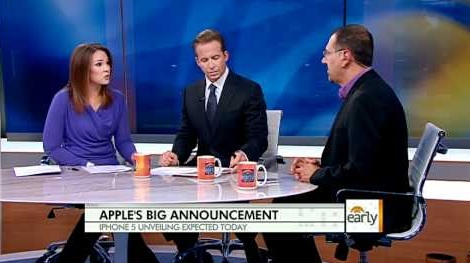 Whether covering cars or assessing the latest TV, digital camera, or MP3 player, Cooley is the go-to-guy for all aspects of technology. His recent appearance on the “CBS This Morning” show to share an in-depth evaluation on the iPhone 5 all but confirms that. I spoke with Cooley about how he manages to prioritize all of today’s most sought-after gadgets while still taking on meaningful causes outside of work.
Whether covering cars or assessing the latest TV, digital camera, or MP3 player, Cooley is the go-to-guy for all aspects of technology. His recent appearance on the “CBS This Morning” show to share an in-depth evaluation on the iPhone 5 all but confirms that. I spoke with Cooley about how he manages to prioritize all of today’s most sought-after gadgets while still taking on meaningful causes outside of work.
Please tell me about your career prior to CNET.
Before I came to CNET.com in 1995, I did morning radio in San Francisco and L.A. for about a dozen years so I don’t come from the tech media and reviews business originally. I got into that. There was no such thing as a tech format at a radio station although we launched one later. I was doing mostly urban and hip-hop radio from 1986 until 1995.
If you were hosting hip-hop radio in 1986 you were doing this when hip-hop was still considered a fad.
When I started at KMEL in San Francisco we were crossing over Bel Biv DeVoe and mixing that up with Paula Abdul. That was pretty street stuff. Everybody else was still playing a lot of Rick Astley and stuff like that.
Was there any resistance at that point?
Oh yeah. If you remember back when Terence Trent Darby came out with his record it was a mix of something that was highly produced in one sense but very gritty and kind of going towards that urban direction in another sense. That was when our program director Keith Naftaly was a visionary in terms of starting to crossover urban acts into what would otherwise be called CHR [Contemporary Hit Radio]. I don’t think they really use that term anymore but that was basically your Top 40 station at the time and then you started to crossover more urban acts.
Did you also conduct artist interviews?
Yeah, I did a number of them. I have an early interview with Digital Underground when they were brand new and just local guys across the Bay. I think I had Too Short when he was still starting up. We used to do a lot of concerts called Summer Jam. Everyone has the Summer Jam now but we had the first thing called Summer Jam and at that time it was about raising money to stop the spread of crack because that was the thing on the street. We had a lot of artists come into the studio and we did a public affairs program on the weekends and they’d also be on the morning show that same day. It was cool to interview these guys when they came up.
That must have been a very tough time for hip-hop artists trying to evolve with minimal airplay on mainstream radio.
Yeah, black hip-hop artists didn’t end up on pop stations. That’s sort of the way it was in those days. Black artists were on black stations. We had a couple of stations here that were playing a lot of black artists that weren’t nearly as mainstream or popular as we were so for KMEL to do that was big. Keith had great ears for the club and saw stuff coming pretty early. Outside of New York I’m not sure of any other market that did this. L.A. was pretty late to crossover.
You joined CNET during its infancy. What were the risks involved?
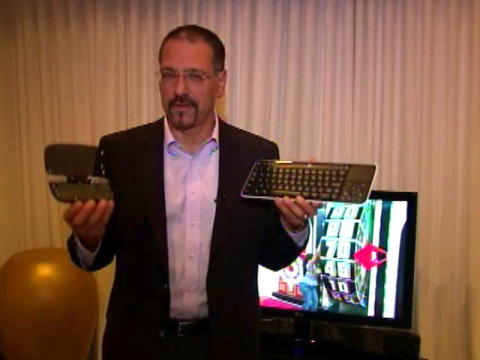 I was working at my last radio station which was a talk radio station. I was working here in San Francisco and the station wasn’t doing well. Luckily, I got a call from a guy at CNET which I barely heard of at the time also based here in San Francisco and it was the president of CNET and he said he wanted to start doing radio on the Internet and doing tech news reports that people can listen to on the Web site. He said he heard me doing tech news on the talk station I was working for and asked if I was interested in talking it up about working there. I was already into tech and I was already into the Web which was pretty early. I took the chance and I remember thinking when I signed the deal to come to CNET that I must be nuts. I had no idea whether the company had enough money to make payroll. It was a tiny company. At the time, I was working for Westinghouse which was about to become CBS radio so I was working for the biggest broadcast company at the time and I went to this tiny start-up but I always dug tech and I’d already been building Web sites at that point so I got the Web pretty well and I had the gut feeling that it was going to be big.
I was working at my last radio station which was a talk radio station. I was working here in San Francisco and the station wasn’t doing well. Luckily, I got a call from a guy at CNET which I barely heard of at the time also based here in San Francisco and it was the president of CNET and he said he wanted to start doing radio on the Internet and doing tech news reports that people can listen to on the Web site. He said he heard me doing tech news on the talk station I was working for and asked if I was interested in talking it up about working there. I was already into tech and I was already into the Web which was pretty early. I took the chance and I remember thinking when I signed the deal to come to CNET that I must be nuts. I had no idea whether the company had enough money to make payroll. It was a tiny company. At the time, I was working for Westinghouse which was about to become CBS radio so I was working for the biggest broadcast company at the time and I went to this tiny start-up but I always dug tech and I’d already been building Web sites at that point so I got the Web pretty well and I had the gut feeling that it was going to be big.
I began to do technology news reports three times a day that were basically podcasts but back then we didn’t have feed technology so you had to come get them every day. I would send out an e-mail to everybody who subscribed to let them know that the new episode was up so they could download it. You had to go to the site, right-click, save and listen on your computer because there were no iPods. So that’s what brought me to CNET which was my love of radio but a new cool platform to do it on.
When did cars come into play?
We didn’t add cars until 2005, a decade after we started. I was covering regular tech, mostly computers, the Internet, laptops, and eventually PDA’s and Palm Pilots. But there wasn’t a lot of tech in the mid-90s like we have today. There were no HDTVs. You didn’t have Blu-ray. You didn’t have broadband. Everybody was on a modem still. Forget about digital cameras. Those were still really rare. So all we had was computers and the Internet and that’s all that we covered.
Please talk about CNET’s growth over the years.
A lot of people who are at least 30 will remember that we started off with a TV show called CNET Central on cable and that was originally the business. We were going to be a TV show with a Web site to promote it. Right after I got there the founders in their wisdom made a key move and said that the Web site would be the main business and use the TV deal to promote the site. That was a pretty ballsy move at the time because the Web was still an unproven business. That was critical. Our first host who auditioned for us and did episode one was Adam Curry from MTV and then later on Ryan Seacrest was one our hosts before he blew up really huge and a lot of folks remember a guy named Richard Hart who is kind of the dean of the television tech hosts. We ended up being a Web company and that was obviously the right decision. We are the largest technology media source in the world. That’s very gratifying because it’s relatively easy to set up shop and come after us.
Do you take any credit for creating a blueprint for the way that technology is currently being reviewed?
I think I can take some credit for helping. I don’t take solo credit for anything. It’s too big of a world of media these days. Everyone has thought of everything that you come up with somewhere in the world. I had a long contribution to building the idea of realtime media on the Web of getting news from the Web and getting it told in a great fashion as opposed to just Web stories. Web pages were always there but this idea of having radio and now TV and movies on the Web started with audio and we had a really big visibility and really big traffic for getting audio on the Web. We helped get a lot of people used to the idea that you can find great streaming media on the Internet that is going to compete with radio and television. We stayed at it and we did better and better storytelling on the Web where I think a lot of companies stayed focused on their radio stations and their TV stations.
Your title now is editor-at-large. What does that consist of?
One-third of my job is doing the car video that you see and the new project I’ve got is called CNET On Cars which is a show that takes all the videos you see and makes a video show out of it. It’s real new. We are just about to put episode 3 up on Friday at CNETOnCars.com which is a sub-site of CNET. One-third is doing media hits so some folks may have seen me on television or heard me on the radio or seen me on the TVs at Cosco and Sam’s Club and Wal-Mart and that’s media work on other people’s screens and other people’s radio stations as a commentator. The third one is speaking and conferences that I do inside the industry.
What’s your overall process for reviewing cars?
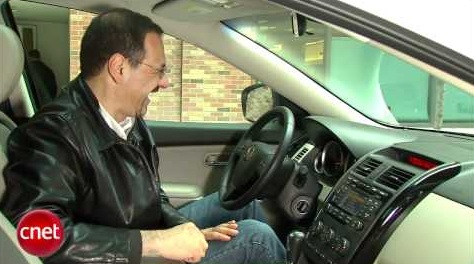
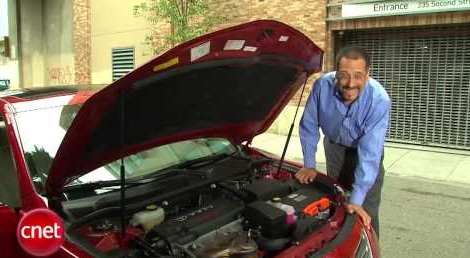 We get two cars a week, just about every week of the year so we get about 100 cars a year. I don’t think anyone does more car video that we do. It’s a lot of coverage. The process is they come in and we have them for a week with almost no exceptions from a Ford Fiesta to a Bentley. We get the cars in and the first thing I do is drive it before I look at the specs and window sticker. I want to know nothing about it and I want to try and judge how the engine is and how the media stuff is in the dash. Am I in a high trim car? Am I in a V6? Am I in a turbo? Because that’s really what matters, not what they tell you but what you know before you get the information. If the car is powerful, I don’t care how many cylinders it has. All I care about is whether it’s powerful. If the car has great media, I don’t care what trim level it is. I kind of want to come at it for what it is and not get preconceived by what it says it is. Then after I’ve driven it for a day or at least a few hours I look at the window sticker. If it’s a 6-cylinder and I thought it was a 4-cylinder that means it’s gutless. If it’s a 4-cylinder and I thought it was a 6-cylinder, I’ll be damned this engine puts out really good power. I come at it like a regular person who would just jump in a car and say do I like it or not.
We get two cars a week, just about every week of the year so we get about 100 cars a year. I don’t think anyone does more car video that we do. It’s a lot of coverage. The process is they come in and we have them for a week with almost no exceptions from a Ford Fiesta to a Bentley. We get the cars in and the first thing I do is drive it before I look at the specs and window sticker. I want to know nothing about it and I want to try and judge how the engine is and how the media stuff is in the dash. Am I in a high trim car? Am I in a V6? Am I in a turbo? Because that’s really what matters, not what they tell you but what you know before you get the information. If the car is powerful, I don’t care how many cylinders it has. All I care about is whether it’s powerful. If the car has great media, I don’t care what trim level it is. I kind of want to come at it for what it is and not get preconceived by what it says it is. Then after I’ve driven it for a day or at least a few hours I look at the window sticker. If it’s a 6-cylinder and I thought it was a 4-cylinder that means it’s gutless. If it’s a 4-cylinder and I thought it was a 6-cylinder, I’ll be damned this engine puts out really good power. I come at it like a regular person who would just jump in a car and say do I like it or not.
Do you ever get any weird feedback from the car companies when you rip their vehicle to shreds in a review?
I don’t lock horns with the carmakers that often. First of all, most of them are really good. They are all big boys and know that they are going to take some knocks on stuff. The auto industry is really sophisticated about dealing with the media and don’t sit there and obsess on everything. We never retract impressions. If it’s a factual error, of course, I correct that right away. I’ve reviewed 1,200 cars at this point and I’ve been to probably 30 auto shows around the world including Geneva, L.A., New York, Frankfurt, and Detroit. Those are the major shows. I’ve got a pretty good feel for what’s happening in the car biz and I let my opinions stand on their own.
Do people reach out to you directly for advice on what they should purchase?
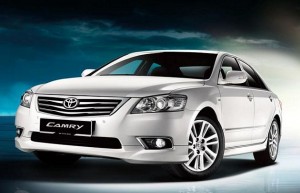 I get e-mails from people all the time who say, “What car should I buy?” There are no crappy cars these days. They are all pretty good. I just answered an e-mail before you called about an Accord versus a Camry. Those aren’t cheap cars anymore. Those are $30,000 cars or so. I purchased two Hondas over the years but today I would buy a Camry based upon what I’ve driven. I get a lot of feedback afterwards saying, “Thanks for your advice.” They just want a simple answer.
I get e-mails from people all the time who say, “What car should I buy?” There are no crappy cars these days. They are all pretty good. I just answered an e-mail before you called about an Accord versus a Camry. Those aren’t cheap cars anymore. Those are $30,000 cars or so. I purchased two Hondas over the years but today I would buy a Camry based upon what I’ve driven. I get a lot of feedback afterwards saying, “Thanks for your advice.” They just want a simple answer.
What are the overrated features that we can live without?
There’s a bunch of them. [He laughs.] I just did a top 5 list on that show I told you about for CNET On Cars episode 2. The number one is the hard drive in the car which typically runs the maps and also carves out space for you to rip CDs to or to transfer MP3s off a thumb drive. It doesn’t make any sense because most of us are trying to get away from managing collections of files these days. We don’t want to have another collection of MP3s on another device. We want to put stuff in the iCloud and stream to Pandora or Spotify or whatever and not screw around synching stuff with iTunes all the time. For them to say here’s another collection for you to manage in your car, I don’t want to do that. I’ve already got an iPod, probably an iPhone. My computer has a collection of files and so does my laptop and I’m always struggling to keep them all in synch. If I have everything Apple, yeah iCloud can probably do that for me but most people don’t have everything Apple. Most people have a mix of Android, Windows, and Apple. That’s just the real world and nothing synchs all that easily. Imagine sitting in your driveway for three or four hours feeding CDs into the dash while it rips them and your neighbors are walking by thinking, “What is wrong with you?” You look like a child molester sitting in your car all night. It’s just weird.
 Another one is self-parking where you literally let off the wheel, baby the brake pedal a little bit, and the car parks itself. I just did a demo on this yesterday in a Ford Escape which is not expensive. On the other hand, while I think it’s a great technology I also think you should know how to park. If you can’t park I don’t know that you can necessarily drive real well. It’s all hand-eye coordination and manual dexterity that I think is essential to driving at high speeds so you should be able to handle it on low speeds also. I love the tech but think we should not need it.
Another one is self-parking where you literally let off the wheel, baby the brake pedal a little bit, and the car parks itself. I just did a demo on this yesterday in a Ford Escape which is not expensive. On the other hand, while I think it’s a great technology I also think you should know how to park. If you can’t park I don’t know that you can necessarily drive real well. It’s all hand-eye coordination and manual dexterity that I think is essential to driving at high speeds so you should be able to handle it on low speeds also. I love the tech but think we should not need it.
Another one is lane departure technology. It uses cameras to detect lane divider lines and alert you when you are drifting across one so you don’t cut someone off. I find it works really unevenly from car to car and by the time it alerts you, you’ve probably already drifted into someone’s lane and their horn and middle finger are going to alert you just fine! And there was a recent insurance industry study that actually found lane departure tech was associated with higher accident rates, not lower. So it needs work still.
With car prices as high as they are you can literally lease or buy a Mercedes C-Class for the same price as a fully-loaded Nissan Maxima. How do you present both sides fairly?
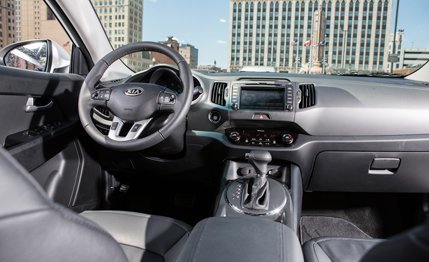 This is an issue. It’s one of value but value also takes into it your personal taste. No one wants to buy the car with the best value that looks ugly or the best value and people sneer at it. This is the problem that Hyundai and Kia have been running into. Along with Ford, they are probably the best value along their range of cars these days. People come to me and say they want a really good car. I point them to Hyundai and Kia especially Kia because they have great looking cars and it’s an incredible value for the tech you get and the luxury you get but people still go, “Really Kia?” They think of it as being some cheap piece of crap and it used to be in the mid to late ‘80s, Hyundai was junk. Hyundai and Kia are basically two sides of the same company but they are outstanding cars today.
This is an issue. It’s one of value but value also takes into it your personal taste. No one wants to buy the car with the best value that looks ugly or the best value and people sneer at it. This is the problem that Hyundai and Kia have been running into. Along with Ford, they are probably the best value along their range of cars these days. People come to me and say they want a really good car. I point them to Hyundai and Kia especially Kia because they have great looking cars and it’s an incredible value for the tech you get and the luxury you get but people still go, “Really Kia?” They think of it as being some cheap piece of crap and it used to be in the mid to late ‘80s, Hyundai was junk. Hyundai and Kia are basically two sides of the same company but they are outstanding cars today.
I’ve enjoyed almost every one that I’ve driven and they’ll give you stuff for free that Mercedes will charge you hundreds of dollars for like a backup camera or Bluetooth streaming or surround system. You are likely to find it built in cheaply in a Korean car where you have to pay a la carte on a German car that costs more to begin with. I think a lot of the German cars know they can get away with it because they have the image and panache that people want. Some people won’t want to roll up in a Kia if they can swing maybe a two-year lease return C-Class. I would rather drive the car that’s not going to throw my money away because the ultimate goal is to not be an idiot.
Do you ever recommend pre-owned cars to people?
Always! I love pre-owned cars. Don’t buy a new car because cars are so durable today. They build them really well. Technology has allowed cars to be built with such incredible reliability because so much now is electronic that used to be mechanical. The mechanical stuff wears out. The parts wear back and forth enough times and they start to leak or whatever. Electronic stuff doesn’t. Electric motors tend to hold up pretty well and car makers are also very competitive and they also get their parts from all the same companies. The net result is cars today are incredibly reliable so I don’t get nervous about a used car like I would have 20 years ago. I last new car I bought was a 1993 Nissan Sentra SE-R. Ever since then I just buy two-year lease returns or just a flat out used car that is cheap.
What are you driving now?
I drive a 1988 Ford Country Squire which is the last of the full-sided wood-sized wagons. If you want to get a great car for a few bucks you go buy one of those American full-size cars from the late ‘80s or early ‘90s. They are outstanding cars. The gas mileage isn’t great but it’s not awful. It’s not like in the single digits. I average 19 miles per gallon on my big Ford and I paid $2,850 for that car and it looks brand new and I can drive into a parking lot full of Ferraris and everyone is going to come talk about my car.
Do you ever get tempted to buy a new car when you are driving the best vehicles in the world on a weekly basis?
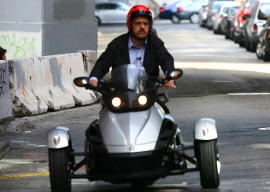 There are probably two and three cars a year that I probably go price out for myself but by the time I get to that pricing thing on the Web site where you go and configure it I say, “No way!.” Twenty to thirty percent of that is gone in a year in terms of value. It’s just that new car residual and they lose such value so fast so it doesn’t make any sense. I’ve looked at 3 series [BMW]. I’ve looked at a Ford Transit Connect. It’s really cool for practical use. I’ve looked at a Honda S2000 when they were still making those. That’s one of the great sports cars ever made. If you go to BrianCooley.com you will find pictures of my vintage cars.
There are probably two and three cars a year that I probably go price out for myself but by the time I get to that pricing thing on the Web site where you go and configure it I say, “No way!.” Twenty to thirty percent of that is gone in a year in terms of value. It’s just that new car residual and they lose such value so fast so it doesn’t make any sense. I’ve looked at 3 series [BMW]. I’ve looked at a Ford Transit Connect. It’s really cool for practical use. I’ve looked at a Honda S2000 when they were still making those. That’s one of the great sports cars ever made. If you go to BrianCooley.com you will find pictures of my vintage cars.
I’m sure people ask you about whether they should be financing or leasing an automobile. What do you tell them?
I tell them to make your own decision based upon your own income and tax situation. These days people are doing a lot of contracting or self-employment so you may be able to do a write-off on a car that you couldn’t do when you had a fulltime job. But if you are out there and it’s part of your work and you are self-employed, you gotta talk about looking at a lease. I recommend a two-year lease return with a factory warranty or what’s called a CPO, certified pre-owned program. Sometimes you’ll get more warranty on a used car than they afforded the new buyer which is really crazy. I used to buy Jaquars on two-year lease returns and they’d be less than a Camry and in new condition with a huge long warranty especially with Jag because they’ve had a hard time with sales in the last couple of years so they’re making some really sweet deals.
So you can actually lease a pre-owned car?
You can lease anything. You can lease a 10-year-old car if you want. There are plenty of companies out there that will find you a two-year old lease return and hook you up with financing and find you the best price on the car so you don’ t have to go stumbling through a bunch of dealers. These car buying services will typically charge you a few-hundred bucks to scour the market, find the car you want in your state, and then set up the deal then get it delivered to your house. It’s better than going to the dealership where they are playing that three-hour game where they are haggling with the closure. The two-year-old car is not going to have the same tech as a car today but you’ll probably have all the important stuff which is a navigation system but not the latest navigation. Two years ago the technology all started to get pretty consistently good on cars.
What are your favorite cars right now?
In terms of just sheer hot I would have to say that the Germans have a headlock on totally cool cars right now. If you go look at the later Audis they have just killer technology and the same thing with BMW. Audi and BMW are in this incredible grudge match over who has the best tech. Mercedes is still catching up. These are cars that have things like Google Earth as their navigation system. They have streaming connections to the Internet built into the car not even needing your phone. They have every media source in the world from SD card slots in the car to all iPod and USB connections and streaming Bluetooth of course and they have great head-up displays where you can put almost everything on the dash on the windshield. BMW does that really well.
I also have to give a shout to GM and Ford who are also doing a great job with tech. I just drove the new Cadillac XTS and it’s got a new system called CUE [Cadillac User Experience]. It’s got a few growing pains but it’s going to become one of the world’s most advanced in-car systems so it shows that the Americans are by no means behind. I have to say the same thing with Ford. They have the MyFord Touch which is their screen system and while it’s also got some teething pains considering the price, Fords aren’t expensive. You’re talking about being a killer touchscreen system in a car that can cost you as little as the low $20,000s for a Focus with a nice system in it.
Please name the vehicles that did not live up to your expectations.
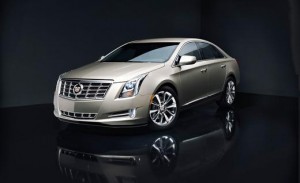 One of the things I see all the time are cars that have great performance but not great responsiveness. There’s a big difference. There are lots of cars that give great horsepower and lots of torque like this Cadillac XTS. It has a powerful engine with 304 horsepower or so but a lot of times there are so many computers in cars now that between the accelerator and the rear wheels lay a bunch of microprocessors and when you step on the gas you are not pulling a cable anymore like you used to in a car 20 years ago. All you are doing it telling a computer that you want it to accelerate the engine and that you want the transmission to downshift and it all goes through computer chips. They tend to take too much time to think and the car ends up being non-responsive. We are about to see 9-speed transmissions on the market later this year. The transmission is always using top gear to get the best fuel economy but then when you want to accelerate you’ve got to step down, not one gear but maybe five gears to get some good power and get the revs up and that makes the car really disconnected to drive. Tech can be a problem when there’s so much complication that cars are less direct.
One of the things I see all the time are cars that have great performance but not great responsiveness. There’s a big difference. There are lots of cars that give great horsepower and lots of torque like this Cadillac XTS. It has a powerful engine with 304 horsepower or so but a lot of times there are so many computers in cars now that between the accelerator and the rear wheels lay a bunch of microprocessors and when you step on the gas you are not pulling a cable anymore like you used to in a car 20 years ago. All you are doing it telling a computer that you want it to accelerate the engine and that you want the transmission to downshift and it all goes through computer chips. They tend to take too much time to think and the car ends up being non-responsive. We are about to see 9-speed transmissions on the market later this year. The transmission is always using top gear to get the best fuel economy but then when you want to accelerate you’ve got to step down, not one gear but maybe five gears to get some good power and get the revs up and that makes the car really disconnected to drive. Tech can be a problem when there’s so much complication that cars are less direct.
The Volkswagen Eos is a huge piece of suckage. We actually opened the video by making a new label for the trunk on the back where is Eos we made one that says Pos [piece of shit]. It’s just a horrible car.
I had the Aston Martin Vantage in a couple months ago. I took it to task because it’s a very expensive car, absolutely gorgeous but almost undriveable because it’s high-tech transmission makes you feel like the car is stalling all the time. It’s a beautiful car but this robotic transmission that they put in there is just not done well. So I don’t let anybody off the hook just because they put some cool tech in there. It’s gotta work.
What do you make of the iPhone 5 craze that is going on? Does the phone live up to the hype?
The iPhone 5 is great is an outstanding phone. We gave it an editor’s choice which is our highest recommendation. The thing that’s interesting about the iPhone now is that it’s no longer the [only] great phone. Now the Samsung phones are killer and the Android phones are ahead of Apple. They do stuff sooner. Apple is playing catchup a lot these days. The iPhone is no longer your only go-to choice. It’s no longer in a class by itself. It’s one of the great smartphones out there. The iPhone is at the head of the pack but it’s no longer is ahead of the pack. Put it against the Samsung Galaxy S III which I would say is arguably as good or better in every way.
I know you are very passionate about animals. Please talk about your philanthropic work.
Yes, I do a lot of stuff that has to do with animal welfare. There’s a great shelter over in Ringoes, New Jersey. The guy that used to be the CTO [Chief Technology Officer] at CNET who was also one of the founders of CNET named Jonathan Rosenberg made his bucks at CNET and he did pretty good. He plowed a ton of his money into opening a shelter for cats that are going to be put to sleep by other shelters that can’t justify keeping them anymore. It’s kind of a shelter of last resort called Tabby’s Place. I’m on the board of the Marin Humane Society out here in California in Marin County and I also work with Best Friends which is a big shelter in Utah and the Humane Society of the United States which is probably the biggest national group. Tech is cool and I love it. It’s a huge force in our life but what’s real is people, the animals, and livings things that technology can help but it’s not the solution. It’s still about spending time and helping out living creatures.

